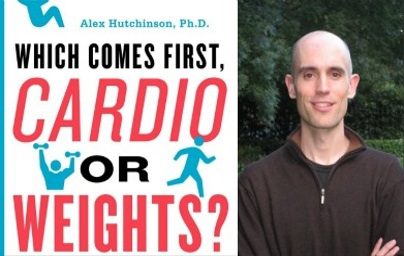Today I want to veer from the common path and do a book review. To be totally honest, this is the first ever book review I've done even though I've become famous for reading a minimum of 1hr/day and have published an extensive book list for trainers. Please do note that the PTDC does get a very small commission if you decide to buy this book. We would never promote anything that we don't 100% believe will help you.
Rarely does a book come along and act as a complete guide for not just trainers but anybody interested in fitness. Alex Hutchinson has accomplished just that. For those of you who don't know Alex. Here is a rundown of his credentials:
- Master's in journalism from Columbia
- Ph.D. in physics from Cambridge (post-doctoral research with the U.S. National Security Agency)
- Senior editor at Canadian Running magazine
- Contributing editor at Popular Mechanics magazine
- Health and Fitness Columnist for Canada's leading newspaper (The Globe and Mail)
- Canadian national team runner between 1997 and 2008 in middle and long distance
The book is called Which Comes First, Cardio or Weights?: Fitness Myths, Training Truths, and Other Surprising Discoveries from the Science of Exercise
It will answer All of your questions about health and fitness.
The following is taken straight from the introduction:
So let me begin with a full disclosure: this book does not contain any secret workouts or magic pulls that will product instant fitness.
Instead, what follows is an up-to-date guide to what scientists know about exercise, health, and performance -- and, just as importantly, what they don't know. It's an "evidence-based" guide: the answers it offers to common fitness questions aren't based on conventional wisdom or gut feelings. Instead, they're drawn from the more than 400 peer-reviewed journal articles listed in the reference section at the back, along with over 100 interviews with researchers from around the world.
In total Alex answer's 112 questions in this 270 page book. It's meant as a reference guide and not to be read cover to cover. The idea is, anytime you or your client has a question you pop out the book. Odds are it's answered in full. I've listed below two examples of questions that I constantly get asked and a snippet from the book:
Does lactic acid cause muscle fatigue? (pg 59-61)
The roots of the lactic acid myth go back to experiments with isolated frog muscles in 1907. When researches applied a shock to the muscles (which were disconnected from the frog's bloodstream and thus had no source of oxygen), they found that lactate was produced. However, when they repeated the experiment with oxygen supplied, the lactate disappeared. Over the next few decades, physiologists developed the hypothesis that muscles produce lactate when they're forced to contract without oxygen and that the accumulating acidity is what causes muscular fatigue.
These ideas weren't challenged until a series of experiments in the 1970s by George Brooks of the University of California, Berkeley, and it wasn't until the past decade that his views gained widespread acceptance. Brooks showed that you don't produce lactate only when you're in oxygen debt. In fact, you're constantly converting your carbohydrate stores into lactate, even when you're at rest. About half of this lactate is then immediately converted into ATP, the basic fuel for muscular contractions. The proportion of lactate used in this way hits 75 to 80 percent when you're exercising, since it doesn't require oxygen. The rest goes into the bloodstream and is used to fuel the heart or is converted by the liver into glucose (another source of energy for working muscles).
What should I eat to avoid stomach problems during exercise? (pg 208-211)
Additionally, your choice of foods can make a big difference. Dietary fiber slows down digestion and also increases bulk in your colon by drawing in water -- so you're better off with white bread than whole-wheat for a pre-workout snack if you've been having GI problems. Foods high in fat also take longer to move through the stomach. Unfortunately, pre-workout carbohydrates come with problems of their own: some people experience an effect called "rebound hypoglycemia" after eating carbohydrates in the hour before exercise, resulting in dizziness, weakness, and sometimes nausea after 15-20 minutes of exercise. This happens because simple carbohydrates trigger a rise in insulin to reduce levels of blood sugar. Exercise also reduced blood sugar, so if you combine the two back to back, your blood sugar levels drop too low and you get light-headed.
One way to avoid rebound hypoglycemia is to abstain from carbohydrates for the hour before your workout. Or you can take the opposite approach: if you eat carbohydrates in the last five minutes before you start, your insulin levels don't have time to spike, thus avoiding the problem. It also helps to stick to foods with a moderate of low glycemic index, which means they cause a slower rise in blood sugar. A banana, a blow of oatmeal, or a piece of whole-wheat bread with peanut butter are good examples of foods with a moderate glycemic index.
I personally own this book and reference to it often. I've also given it as a gift to many of my clients when they hit goals or for birthdays or other special occasions. Just think, you might never have to answer any of these questions again by buying your clients a book. Remember that the more educated they are the stronger your army.











